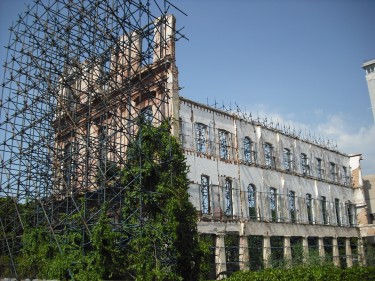Cuban bloggers have done well to document the political, economic, and technological obstacles that prevent most Cubans from using the Internet. But few have written about the political gridlock that has contributed to the island’s poor telecommunications infrastructure.
US-based and US-affiliated telecom companies, which is to say, nearly all telecoms that offer service in the Caribbean, face severe restrictions in the US- Cuba embargo legislation, and this has put Cuba in a fundamental disadvantage for decades when it comes to telecommunications.
President Obama pledged to eliminate these restrictions in 2009, but has made little progress on his promise. In a July/August 2010 editorial in Foreign Policy, Christopher Sabatini summarized the current legislation, which remains too restrictive to allow US-affiliated telecommunications companies to conduct any business on the island, whether it be selling hardware or software, or building new infrastructure. He remarked that with the current policy:
…there's little room for any real U.S. business activity that could link the island to the Internet and provide citizens with the tools of communication. Instead, the provisions only allow for the donation of these items, rendering a critical foreign-policy objective to philanthropy.
The only reforms that have actually been made allow for individuals living outside of Cuba to pay for cell phone handsets and roaming service for Cuban family members and friends on the island. While this has made a difference for thousands of Cubans, the island could gain greater opportunities to access digital communications technologies if President Obama were to further liberalize or eliminate restrictions on telecom companies. He could do this by executive order.
There is no guarantee that the Cuban government would allow US-based or US-affiliated telecoms to conduct business on the island, even if they were free to do so. But by lifting these restrictions, the Obama administration could cease to stand in the way of increasing digital and telecommunications access for Cubans, and put the political ball in Cuba’s court.
While the US continues to postpone reforms, Telecomunicaciones Gran Caribe of Venezuela has proceeded with plans to build a submarine fiber optic cable linking Venezuela’s Caribbean coast, Cuba, and Jamaica. How this will change Internet use in Cuba remains unclear, but it is certain that it will help to further strengthen the diplomatic and political bond between Cuba and Venezuela, an already very sharp thorn in the side of the US government. This could incentivize the Obama administration to pursue further liberalizations, but it hasn’t yet.
Many in the US-Cuba policy community believe that President Obama is running out of the time and political capital necessary to make reforms to the embargo. After Tuesday’s midterm elections in the US, the blogosphere was alive with commentary on the election of soon-to-be Florida Senator Marco Rubio, a GOP and Tea Party magnate and the son of pro-embargo Cuban émigrés. Rubio is adamant about “holding the line” against Cuba.
Anya Landau-French, at The Havana Note, writes that with Rubio in office:
The level of pro-embargo, anti-engagement speechifying, floor-side colleague arm-twisting and bipartisan sign-on letter-writing and hand-wringing will certainly amp up.
Given the changing tide of Cuban-American opinion on US-Cuba relations, will this make a difference? El Yuma predicts that Rubio’s influence on US-Cuba policy (and US politics on the whole) will be formidable, telling readers:
Do not underestimate him or the potential of his wide appeal to American voters outside of the Cuban-American community and outside of the state of Florida…
Whether or not Rubio’s victory will impact President Obama’s decisions regarding executive order-tied reforms, the political climate for change towards Cuba may be growing cold. Phil Peters, of The Cuban Triangle, remarked on the narrowing opportunities for Obama to create meaningful reforms to the embargo. Referring to the recent market-oriented economic reforms in Cuba, Peters wrote:
If President Obama doesn’t respond to incremental changes in Cuba with incremental changes of his own, his offer will at some point become a dead letter, and idea of constructive influence in Cuba….will be empty.









5 comments
Just curious if Telefonica, based in Spain and very strong in Latin America could take the lead, independent of US policy? There are a number of suppliers of network hardware and software that are also not US based, including Huawei in China and Alcatel-Lucent in Europe.
I was hoping that this post would feature the opinions of Cuban bloggers living in Cuba. Yoani Sanchez, who is hardly representative of your typical Cuban blogger, did write a piece for the Miami Herald explaining why she wanted US telecom companies to enter the Cuban market. I think that Claudia Cadelo has written a few pieces too, but I can’t find them right now.
It’s probably important to mention that the cable between Venezuela and Cuba will also connect Jamaica and that it has a capacity of 640 gigabytes, which is massive. (MAYA-1, which passes just 30 kilometers from the Cuban coast and is owned by AT&T, Telmex, and Hondutel, only has an 82.5 gigabyte capacity.)
It’s a shame, however, as you mention in your latest blog post, that it seems that this giant increase in bandwidth won’t necessarily benefit the average Cuban. (Though we’ll have to wait until next year to see how that plays out.)
@paul, the reason why the Spanish or any other international business won’t go in there is because there is no profit model to support this venture. The Cuban Government has made it clear in many official statements that there are no plans to expand access or allow citizens to connect through personal accounts. Telefonica, nor any other company will incur the expenses of modernizing the telecom infrastructure without some promise of profit…